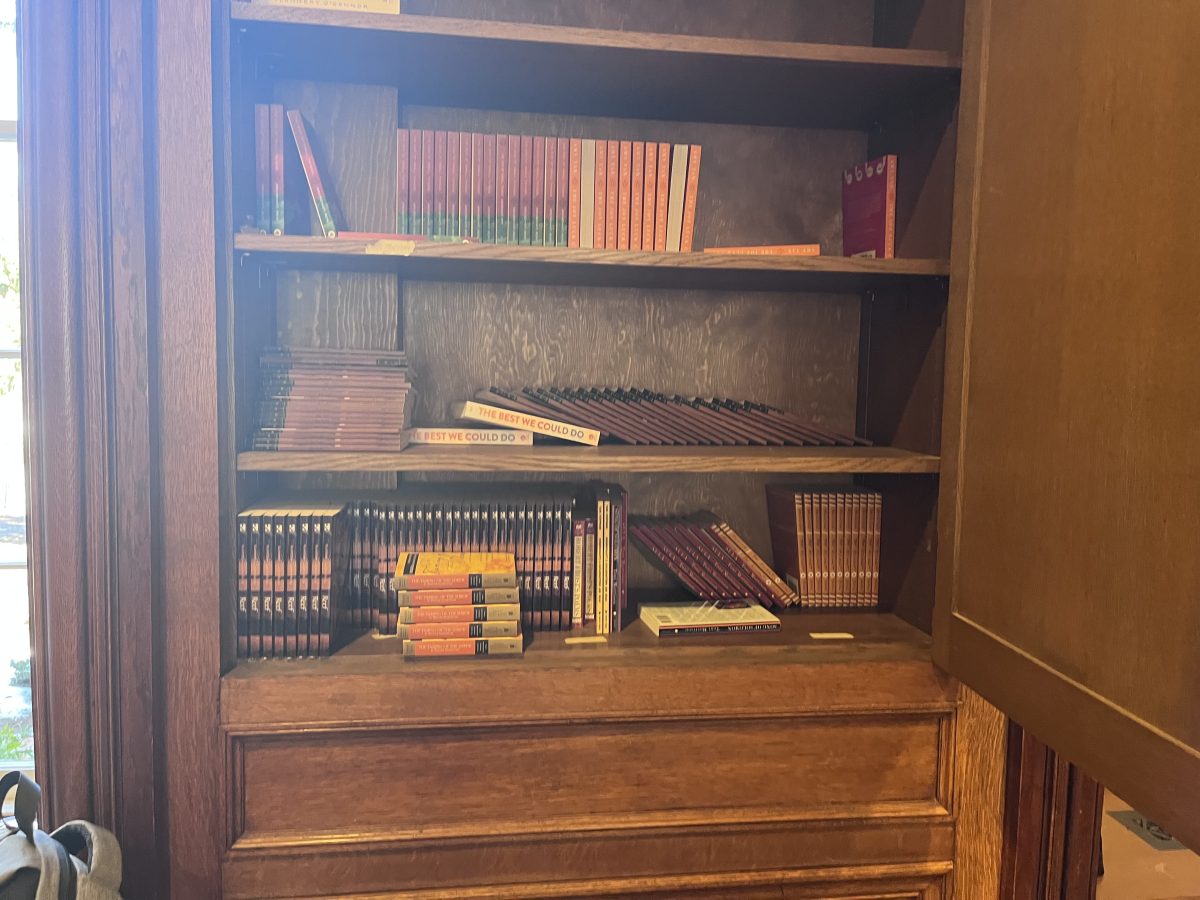In French, students dissect the impact of colonialism on African countries. In English SL, students expand their scope through translated works from South America, Japan and Ancient Greece. In Spanish, students tackle the intersection between corrupt politics, religion and gender during the Spanish Civil War.
In Virginia governor Glenn Youngkin’s first days in office, he banned Critical Race Theory, despite it not appearing in public education curricula. Around the country, debates over school curriculum and books have prevailed. But at WIS, different perspectives are something language teachers embrace.
“We have differences,” Upper School French teacher Charles Gueboguo said. “The point is to show how they enrich us instead of how they just diminish us. So, perspective is very important to show also that there is not always one side or one point of view.”
Gueboguo finds his personal experiences inform his perspective and what is presented in his classes. “I was born in Africa, specifically in Cameroon, and back there I had my background, that culture,” he said. “We’ve been colonized by France so I also have French culture and mixed culture. All that helped me to see things differently.”
Upper School Spanish teacher Antonio Ramallo integrates perspectives from all over the Hispanic diaspora. His focus on perspective stems from his personal experiences, like Gueboguo.
“My family was a farmer’s family; we were poor people,” Ramallo said “And of course, we knew that. On the other hand, my family in Cuba is considered white.” Therefore, he felt both privileged and not while he lived in Cuba, and, as a result, people did not see him as Cuban.
In order to develop perspectives taught to students, teachers initially look for them in the IB prescribed titles for the Diploma Program (DP). They also choose texts that present different perspectives for the ninth and tenth grades.
“There’s a long list of prescribed texts for the DP, but we also have a choice,” Upper School English teacher Nicholas Loewen said. “So in the last maybe five to seven years we’ve been more and more conscious of spreading the wealth between white males and other authors.”
The IB’s emphasis on internationalism also allows for the development of perspective through the prescribed texts. “IB is doing a great job so far in terms of identifying those global issues,” Gueboguo said. “It is up to us teachers… to be specific, to narrow it down.”
Teachers do so through incorporating diversity, specifically the nuanced perspectives found in different literary works students read in class.
“You have here the problem of fascism in Spain,” Ramallo said about “Antonía poética,” a poetry book by Miguel Hernández read in eleventh grade. “But, also, you have the product of diverse groups that were involved in the Spanish Civil War from people that were communists, socialists, anarchists, social democrats paying the Spanish Catholic Church.”
Incorporating different perspectives and choosing authors is an evolving process. Loewen has given surveys to his students asking about both what to keep or change.
“So, we used to have Of Mice and Men because it’s a really well crafted book,” Loewen said. “But, we decided the skills that we’re trying to teach with it, we can teach with lots of other books, so I replaced it.”
The language teachers agree that they do not decide on a throughline theme across their years reading literature, but they become recurring throughout their four years in the upper school.
“We can talk about the situation of women in a patriarchal society,” Ramallo said. “Day one, we talk about the situation of people with different sexual orientation.”
Because themes like identity are found in several books, students can develop their understanding over their time at WIS. The language department has tried to show the reality at the end of reading something, according to Gueboguo.
“My strategy is to start working on those concepts without giving the name,” Gueboguo said. “What does postcolonialism look like? For example, is it exploitation? Is there a lack of inclusion? Is it the lack of diversity?”
The material that is taught in language classes can be sensitive, includingdiscrimination or government corruption and its impact. Therefore, teachers do not shy away from it, and instead, frontload it when starting a book.
“In discussion, [Toni Morrison] set up this black community at the beginning of Sula in Ohio,” Loewen said. “Black people lived in what’s called the bottom and I talked about how historically in the US, oftentimes, [Black people] have to live in the lower area, while white people live in the higher area.”
Loewen approaches topics by being straightforward and honest, rather than glossing over the texts’ important contexts. Additionally, he does not allow slurs to be used in class discussions.
But in terms of integrating perspectives, WIS diverges from the ongoing battle against varied perspectives in American public education. Developing these points of view are incredibly important to the language departments.
“[This] is one of my main goals in life, not just to teach Spanish but to teach the students how to think critically, and to see reality in a critical way,” Ramallo said. “And precisely the books that I choose or are chosen by the department give me the opportunity to do that. I feel very positive because I never remember any student who has rejected any of the ideas that we have to try to develop.”
Teachers are continuously changing the books they read in order to expand their curriculum and the perspectives they integrate into class as they acknowledge they could always do better.
“It’s a work in progress,” Loewen said. “We’re always thinking about it and trying to choose new books and keep it fresh and evolving.”
By Rose Boehm

































































